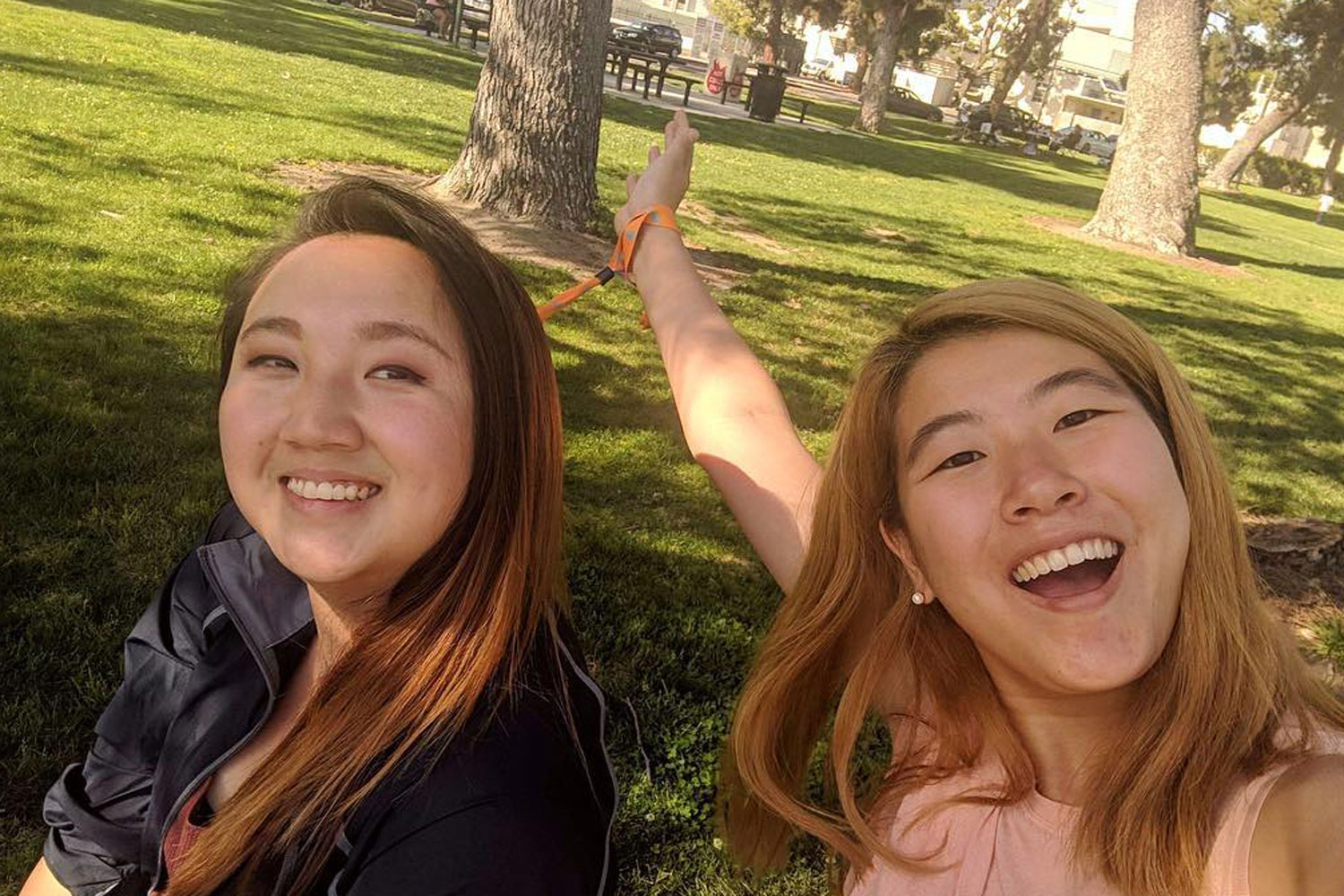Student filmmakers go Hollywood
Stanford students were recently invited to a movie studio near Los Angeles to bring their screenplay to life.
Students Juliana Chang, ’19, and Da Eun Kim, BS ’17, MS ’18, knew little about making movies when they accepted an invitation to self-produce their short film at Warner Bros. Studios near Los Angeles last month. The students teamed up with Matt Shimura, ’19, for a two-day whirlwind film production that brought to life their original story about identity, culture, relationships and how to manage small, everyday interactions.

Juliana Chang and Da Eun Kim on the set of their film, Many Names. (Image credit: Juliana Chang)
The production was part of the nationwide AT&T Create-a-thon filmmaking competition. Chang’s original screenplay, Many Names, chronicles a day in the life of a young Korean woman named Euna Kim as she navigates the delicate process of teaching people how to say her name, pronounced ŭ-na. The story was one of more than 500 screenplays submitted to contest organizers. Sixty-four scripts were then selected to be produced by the applicants, who filmed one scene at the Warner Bros. main lot.
Chang and Kim were both out of state when they learned that their script was selected. After receiving the good news, they realized they had no funding or equipment, and only two weeks to prepare to film in a city in which they didn’t live. “The entire pre-production process was done remotely while I was in China and Juliana was in New York,” says Kim. “Neither of us come from L.A. and neither of us were even on Stanford’s campus!”
The pair launched a Kickstarter campaign to raise $1,100 for costs of production and a place to stay in Los Angeles. They also scouted locations, found actors, hired a production assistant and enlisted Shimura – an experienced filmmaker who serves on the board of Cardinal Studios – to be the director of photography.
Production of Many Names occurred the first weekend in June. The first day of filming took place on the Warner Bros. lot, where Chang says they received very little guidance from competition organizers. “They just gave us the time slot and location and we had to show up with a cast and crew,” she says.
While many of the production tasks were assigned to whoever was available at the moment, Shimura and Chang co-directed the actors, something Chang had never done before. But she says it came naturally.
“I just had to convey the vision I had in my head and try to get them to match that,” she says. “It was interesting seeing something I’d written come to life in front of me.”

Da Eun Kim (center), Matt Shimura (with camera) and actors on the set of Many Names at Warner Bros. Studios. (Image credit: Juliana Chang)
The scene they selected to film involved the lead character, Euna, teaching her date how to pronounce her name. It was shot on an outdoor set, in front of a faux building that had once been used in an episode of Pretty Little Liars.
The students say that filming on the lot was hectic because there were several other teams filming nearby, as well as loud tour groups driving through the lot. “Framing was an issue because we didn’t want to get other teams in our shots,” says Shimura. “We had to work around that but it ended up all coming together. We made it work.”
The students say the film was more than a creative challenge – its message was personal. The film’s themes reflect the struggles experienced by many people with non-Western names living in Western cultures.
“If you have a name that’s hard to say, you spend a lot of time thinking about when to correct people and in what situation do you tell someone how to say your name correctly,” says Chang, whose legal name is Ting Wei Chang.
When you have a culturally unconventional name, small, daily interactions like placing an order for coffee can be an awkward experience, Kim says.
“Juliana and I have the shared experience of having a non-Western name and the different thought processes that come with that identity,” says Kim, adding that she’s grown more aware of the assumptions people make about her based on her name. “People have assumed I’m an international student or that I can’t speak English well,” she says.
For Shimura, joining the project was also an opportunity to increase diversity. “In Hollywood, there’s almost no Asian American representation. I think [this film] is an important move for equality, both on screen and off screen,” he says.
Of the 64 films produced in the competition, Many Names was ultimately selected as a top-four finalist. Watch the film below.
Go to the web site to view the video.
